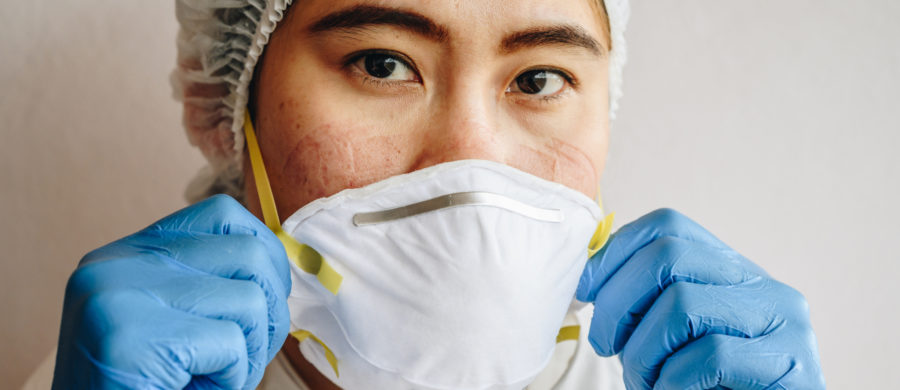Wearing a mask can be hard on your skin. Board-certified dermatologist, Lindsay Boyers, MD, shares tips to help prevent and treat mask-related skin concerns.
- Cleanse your Face Daily – I recommend gentle, fragrance-free products such as Vanicream gentle cleanser, Cerave foaming facial cleanser, or EltaMD foaming facial cleanser.
- Moisturize to Help Protect your Skin Barrier – Dry skin is irritated skin. Moisturizers with ingredients such as ceramides, hyaluronic acid, and dimethicone will provide the most benefit. Check the label for “non-comedogenic,” which means it won’t clog pores. Pick a moisturizer based on your skin type: for oily skin (or hot weather) use a gel, normal/combo skin use a lotion, and dry skin use a cream. Pearl: apply moisturizer immediately after washing your face for the best results.
- Avoid Makeup Under your Mask – If makeup is necessary, ensure that it is labeled “oil-free” or “non-comedogenic” and opt for light powders over heavy foundations.
- Avoid Trying New Skin Care Products – It may be time to temporarily pause strong retinoids, chemical peels, and exfoliating. If adding new products is a must, add them slowly (only one new product at a time over a few weeks).
- Cut Back on Irritating Skin Products – Wearing a mask can make your skin more sensitive overall. Some products that you have routinely used may be irritating you. Consider the following: decrease the strength of your retinoid, decrease the frequency of your retinoid, switch from leave-on salicylic acid to a wash, and avoid aftershave.
- Apply Petroleum Jelly to Protect your Lips – The best time to apply is after washing your face, before putting your mask on, and at bedtime.
- Wear your Mask Correctly – Wearing your mask too loosely results in decreased virus protection. Too tight can increase abrasions, cuts, and damage to the skin. If your mask fits poorly, you are more likely to be constantly adjusting it and transferring germs to your skin/face. Avoid synthetic fabrics such as nylon, polyester, and rayon. Consider a silk mask if your skin is acne prone.
- Wash your Mask after every use to remove bacterial/oils/dead skin cells. Use hot water, fragrance-free hypoallergenic detergent (such as All Free & Clear), rinse twice, and avoid fabric softeners.
- Take a 15-Minute Break Every 4 Hours – Do this if you need to wear your mask continuously and be sure that removing your mask is safe, such as outdoors while maintaining social distancing guidelines, in your car alone, or at home.
- For Soreness Behind the Ears – consider trying masks with different types of ties/loops and alternate between these different masks daily.
- Wear Sunscreen – Don’t forget about those areas on your face that are not masked, as they are at risk of skin cancer, especially at high altitude here in Boulder County. Pearl: Sunscreen is your best anti-aging defense.
When to See Your Dermatologist
If the above interventions don’t cut it, consider seeing your dermatology provider to help customize a plan based on your particular skin type and concerns. Please continue to wear your mask in public to help protect you and others from COVID-19.
About Lindsay Boyers, MD
Dermatologist
Boulder Medical Center
Dr. Lindsay Boyers chose dermatology as her specialty because she loves the multifaceted components of the field, including clinical medicine, surgery, cosmetics, and histopathology (the study of changes in tissues caused by disease).
She enjoys helping a diverse range of patients understand their body, especially their skin. “Our skin is often a window into processes that we cannot see,” she explains. “Working with patients to understand what is going on with their body and empower them with knowledge and access to treatments that benefit their lives is rewarding for me.”
- Dr. Boyers Full Profile
- Call (303) 440-3013 for an appointment


